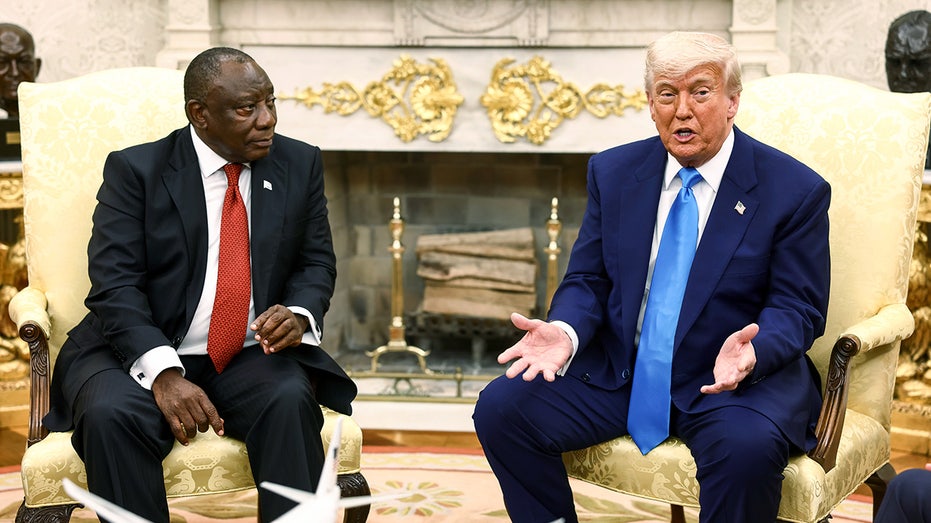Trump's Criticism of South Africa's Crime Crisis Gains Surprising Local Backing
Analysts suggest Trump's sharp critique of South Africa's crime efforts during a tense Oval Office meeting has bolstered the country's fight against crime.

South Africans have expressed a mix of relief and support following President Donald Trump’s recent Oval Office remarks harshly criticizing the country’s record on violent crime, particularly farm murders. During an unprecedented meeting with South African President Cyril Ramaphosa, President Trump reportedly shared video evidence and a compilation of news articles alleging a pattern of farm killings, sparking debate both at home and abroad.
Analysts in South Africa say Trump’s direct confrontation with Ramaphosa brings urgent international attention to the nation’s entrenched issues with violent crime. For many observers, the exchange signaled much-needed outside scrutiny on what they consider insufficient efforts by the South African government to stem soaring murder rates. According to the latest police statistics, nearly 7,000 people were killed across the country in the last three months alone—an average of 76 murders every day.
Adding to the concern is the country's low murder conviction rate. Between 2019 and 2022, only 12% of murder prosecutions ended in convictions, casting doubt over the effectiveness of law enforcement and the judicial system. Frans Cronje, president of the Yorktown Foundation for Freedom, noted that South Africa has maintained an intentional homicide rate of roughly 40 per 100,000 people since the end of apartheid in 1994. In comparison, the global average is closer to four per 100,000. “More people are murdered in South Africa annually, with its population of just over 60 million, than across the entire Western world, with its population of almost a billion,” he said.
At the same time, domestic critics continue to lambaste the South African government for what they describe as poor leadership in addressing violent crime. Cronje emphasized that the lack of progress could have broader economic consequences: “External U.S. pressure to address the violence as a precondition for any major investment treaties is pressure that domestic South African activists may employ to address their government’s neglect.”
Max Meizlish, a senior research analyst at the Foundation for Defense of Democracies, points to decades of government corruption as a root cause behind the deteriorating situation. “It’s clear that decades of corruption in South Africa have hollowed out the state’s ability to provide even the most basic services—from reliable water and electricity, to a functioning police force and equal protection under the law,” Meizlish observed. He also highlighted the ANC’s loss of its national majority in 2023, its first such defeat since the party took power in 1994, as evidence of declining public trust.
The focus of the South African government, some argue, has shifted away from internal reform. “The Ramaphosa government is devoting more time and resources to courting BRICS allies like China, Russia, and Iran than to restoring order at home,” Meizlish continued. He supported President Trump’s approach in placing pressure on South Africa concerning land reform, human rights abuses, and the country’s geopolitical alignments.
In a striking moment during the Oval Office meeting, Zingiswa Losi, president of the Congress of South African Trade Unions, drew attention to the broader scope of violent crime—not just racial attacks or farm killings. “There is no doubt about it that we are a violent nation,” Losi stated. She described unchecked violence in rural areas, where vulnerable groups including women and the elderly are frequently targeted. “The problem in South Africa, it is not necessarily about race, but it is about crime,” she added, emphasizing the need for both nations to collaborate on strategies to reduce crime and encourage investment.
Amid mounting security challenges, South Africa’s government is reportedly reconsidering earlier restrictions on Elon Musk’s Starlink satellite communications system. Sources indicate that officials, who previously demanded local ownership stakes, now recognize that expanded internet connectivity via Starlink could aid efforts to protect remote farming communities and improve overall security.
Crime data released last week continues to fuel debate. Police reported that, in the first quarter of this year, five out of six people killed on farms were Black and one was White. However, critics caution that these statistics lack independent verification, and concerns persist over inadequate police protection, especially outside urban centers.
The sense of vulnerability cuts across racial lines, as reflected in the words of a Black farmer mourning a murdered White colleague: “Although he’s White, we don’t look at the color. We are doing the same thing. Next time it’s going to be me.” For many South Africans, this sentiment underscores the shared dangers facing rural communities and the urgent need for meaningful action.
The South African government did not respond to requests for comment regarding the meeting or the allegations raised by President Trump and American analysts.




